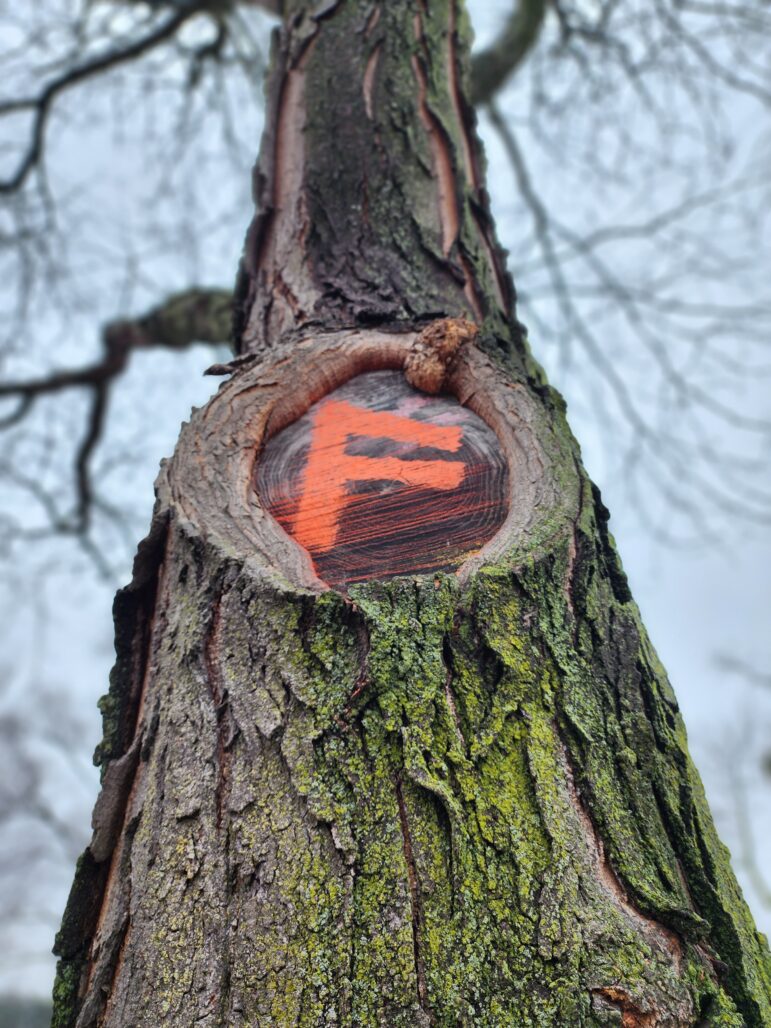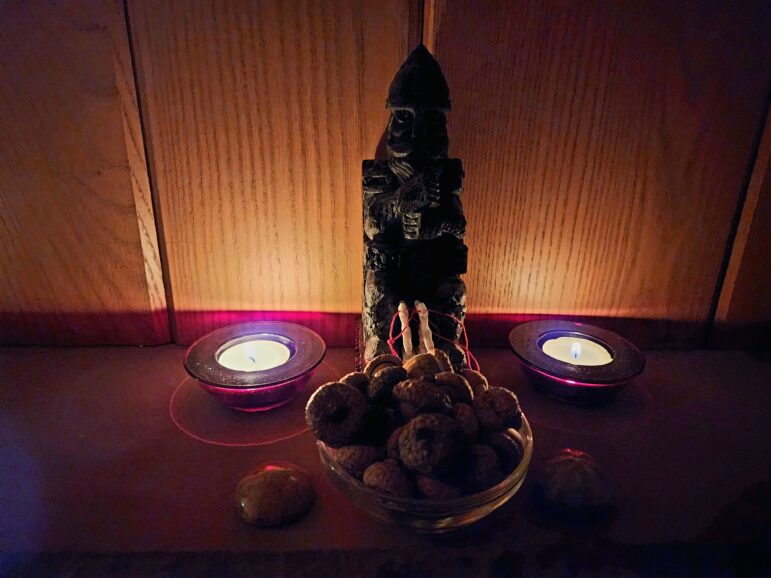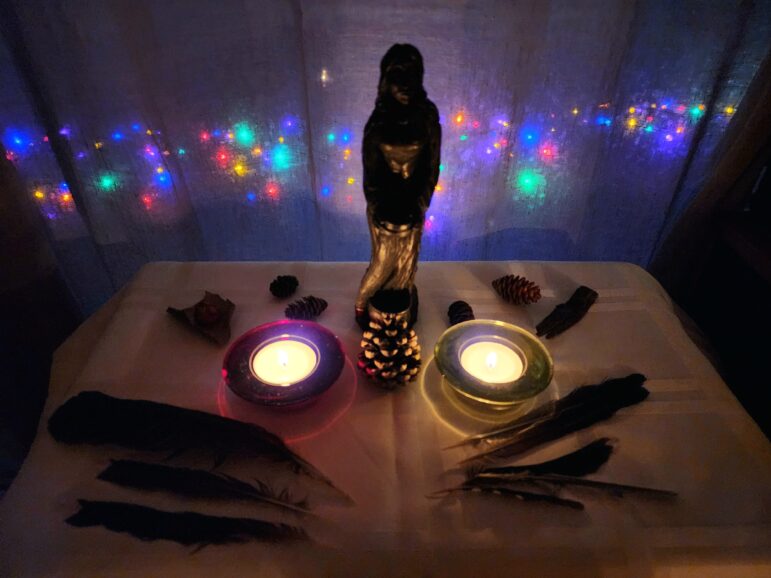
Editor’s note: Today’s offering briefly mentions sexual violence.
“How do you work with the Norse gods?”
Every once in a while, I get asked a form of this question.
Sometimes, it’s about the Norse deities as a group. Sometimes, it’s about a specific single figure.
The asker is usually someone who practices some version of Wicca, eclectic Paganism, or a hybrid that includes figures from Norse mythology next to deities from other world traditions. Sometimes, the asker is simply new to Ásatrú and Heathenry and is still trying to figure out the modern variations of praxis.

Tree marked with *ansuz rune for Thor’s Oak Kindred Midwinter Blót [Photo by Karl E. H. Seigfried]
I didn’t come to Ásatrú through Wicca or general Neo-Paganism. I wasn’t a seeker, and I had never been religious. Like many Heathens the world over, I read the myths and realized that they were deeply connected to something I had always been. It was a realization, not a conversion.
So, I never had the experience of doing ritual workings as such, magically conceived or otherwise.
The Ásatrú ritual of blót, at least as I have experienced it with various groups in the United States and abroad, really seems like a distinctly different practice – one that is centered on maintaining reciprocal relationships with various powers via giving thanks for past gifts, asking for future gifts, and making offerings.
There are definitely different forms of the rite, but I have never personally seen them as magical workings. Of course, within academia and without, there have long been lengthy debates about distinctions between magic and religion, between “working with” and worshiping.
Now, in the spirit of this midwinter season of togetherness and sharing, I’d like to give at least a partial answer to all those who have asked me about working with the Norse gods.
Before offering my suggestions for three of the Norse deities, I’ll briefly review the history of the divine trio in Norse and Germanic sources.
The trio through the centuries
Way back around 50 BCE, Julius Caesar describes the religious practices of the Germanic tribes he encountered on his northern campaigns. In his Commentaries on the Gallic War, he writes that they only worship the gods whose deeds they enjoy: Sun, Vulcan, and Moon. It’s tempting to see a reverse echo of Thor in whatever Germanic deity Caesar interpreted as the hammering Roman smith-god, but this really isn’t much to go on. What’s notable is the concept of a core divine trio – an idea that recurrently reappears over several subsequent centuries.
In 98 CE, the Roman historian Tacitus writes that the Germanic tribes, above all other gods, worship the trio of Mercury, Hercules, and Mars – the first with human sacrifice, the others with animal sacrifice. Again, there’s not much there, but the Romans seem to connect an Odin-like figure with the traveler Mercury and a Thor-like figure with the monster-slaying Hercules.
Around 550, a brooch from Nordendorf, Germany, is inscribed with runes that list a trio of names or titles: logaþore, wodan, and wigiþonar. Wodan is clearly Wotan/Woden/Odin, and Wigiþonar likely means something like “Thor Who Blesses.” Logathore may be the shadowy figure Lodurr, who is part of a different divine trio in the Old Icelandic poem Völuspá (“Prophecy of the Seeress”); along with Odin and Hœnir, he creates the first humans from a pair of trees.
In 742, the future St. Boniface leads the church council at Lestines (now in Belgium) that composes the formal renunciation by which Germanic polytheists renounce their former faith on conversion to Christianity. The text to be spoken by the new converts includes a formal forsaking of the trio of Thunaer, Woden, and Saxnote. Thor and Odin are again present and accompanied by a debatable third partner, this time with a name or title possibly meaning “Saxons’ friend” or “sword-friend.”
In the 1070s, the German chronicler Adam of Bremen records information about the temple in still-pagan Uppsala, Sweden, that features a trio of sacred statues with Thor at the center, an armed Wotan/Odin on one side, and a generously endowed Frikko/Freyr on the other.
In his Edda of c. 1220, the Icelander Snorri Sturluson writes that the first jötunn Ymir was killed by the trio of sons of Bor – Odin, Vili, and Vé. Their names can be translated as “fury,” “will,” and “sacred enclosure / holiness.” They can also be interpreted as “heart,” “mind,” and “spirit.” Snorri, in contrast to the poem Völuspá, states that this same trio also created the first humans from trees.
Also in the Edda, Snorri writes of the trio of gods who sit in judgment of the wondrous creations of the dwarfs. The judges are Odin, Thor, and Freyr – the same group that Adam of Bremen writes are worshiped in Uppsala nearly two centuries earlier.
Finally, the Icelandic Olaf Tryggvason’s Saga and Book of Settlements both mention an oath being sworn in the past upon a sacred temple ring to the trio of Freyr, Njordr, and hinn almáttki áss (“the almighty one of the Æsir”). The most likely candidate for the title here seems to be Thor, but arguments can be made for Odin and others.
The trio today
Although its members are variable, there is indeed evidence for a trio of divinities being given precedence in both religious practice and mythological lore. The most common version seems to consist of Odin, Thor, and a changeable third figure.
For practitioners of Ásatrú, a post-1972 new religious movement that looks to long-ago Norse and Germanic sources for inspiration, this evidence can motivate us without constraining us.
In my own practice, the trio has long been Odin, Thor, and Freyja. My personal altar is built around small figures of these three divinities – figures that also serve as the focus for the community blóts of Thor’s Oak Kindred.
This doesn’t mean that we only venerate these three deities. In addition to our Midsummer Blót to Thor and Yule Blót to Odin, we celebrate a springtime Vanir Blót and a Fall Blót to Týr. We also make offerings to the earth goddess Jörd and to our local land spirits.
Celebrating our trio doesn’t mean denying the other deities. Polytheism simply doesn’t work that way, and this is not a Christian Trinity.
It simply means that these three divinities are ones that we regularly address, and that they are deities to whom we more often turn.
We do not only turn to them during personal and communal blót. To do so would be to make us blót Heathens, like Sunday Christians who only think on the teachings of Christ while actually sitting in a church pew for one morning per week.
To honor the gods is to keep them always in mind, to see the world through the lens of their tales and teachings.
To honor the gods is to follow the portrayals of positive action in the lore and to avoid the models of negative action.
To honor the gods is to do deeds that are deserving of them, for Odin teaches us in Hávamál (“Sayings of the High One”) that, in the end, it is our deeds – not our proclamations – that truly matter.
To honor the Wanderer
Like so many gods in so many traditions, Odin is complicated.
This does not mean that we have to embrace every facet of his character or emulate every aspect of his mythology.
As in all things, we can be discerning citizens of the world who, when faced with complication, make educated judgments and choose right action over wrong.

Main altar to Odin for Midwinter Blót [Photo by Karl E. H. Seigfried]
The aspect of Odin with which I’ve always identified is that of the Wanderer, the wizard who walks the world in search of wisdom. He enters the strongholds of ancient and powerful jötnar, he quizzes prophetesses alive and dead, and he sacrifices himself to himself, all to gain more knowledge of the past, present, and future – and of the worlds around us.
To work with Odin is to follow this path. To honor the Wanderer is to take up his deep embrace of wisdom.
But Odin is also a god who guides fighters. The small statue of Odin on my altar, honored as the wizardly wise one, wears a warrior’s helmet.
To work with Odin is also to fight for wisdom, to stand up when teachers and students are threatened.
They are being threatened right now.
Adam Laats, Binghamton University professor of education and history, has written and spoken about the long history of far-right movements in the United States that have portrayed themselves as “concerned mothers” while actually working for extremist political objectives. Where these movements go, violence often follows.
In his public work, Laats details how, from the 1920s on, the Daughters of the American Revolution campaigned to keep public schools “fundamentally Anglo-Saxon” and to control what teachers teach and what students read. They insisted that, as mothers, it was their duty to “guard well” the schools from troublesome ideas like “teachers who say there are two sides to every question.”
In the 1970s, long-time anti-abortion and anti-sex-education activist Alice Moore emulated the Daughters by rebranding herself as a simple mother who only wanted to protect the children as she took over her local school board, banned books, and declared that parents had the right to control classroom learning – all with an emphasis on preventing white children from learning about the history of racism in the United States.
Stepping into the national spotlight, Moore denounced textbooks and led boycotts of public schools using inflammatory language about harm to children that led directly to her school board being dynamited, schools being firebombed, non-right-wing school board members being publicly assaulted at their meetings, school buses being shot at, and the Ku Klux Klan burning a cross in front of the school district headquarters.
More recently, Moms for Liberty has taken up the same old mission of controlling public education, used the same old posture of concerned motherhood, and promoted the same old rhetoric of saving the children. Co-founder Bridget Ziegler has followed Moore’s model of joining the public-school board in order to get rid of the LGBTQ+ teachers they slander as “groomers” and ban books by Black authors and any others who don’t meet their criteria of right white might. As the KKK supported Moore in the 1970s, the Proud Boys stand by Moms for Liberty in the 2020s.
Ziegler’s anti-gay stance has extended to her political work with Florida Governor Ron DeSantis to pass the state’s “don’t say gay” law – a fact which has been thrown into bizarre relief by the revelations that she and her husband have been in a three-way sexual relationship with another woman, that the trio made at least two sex tapes (now in police possession), and that her husband allegedly raped their female partner. As is so often the case, the ones most loudly screaming about the supposedly corrupting influence of any but the most vanilla sexuality are neck-deep in the very practices they accuse others of. Rules for thee but not for me.
Here is the opportunity to honor Odin as warrior for wisdom.
Don’t let the hypocrites and control freaks determine how our nation’s children are educated. Trust teachers and support them.
Educate yourself on how to run for and get elected to your local school board. Then do it. The software company Diligent has gathered a good informational list to get you going.
The Ed Post website has a simple explainer on how to run, and Run for Something offers a “50 State School Board Strategy” specifically “to fight back against Moms for Liberty and other far-right groups.”
Facing the bad actors who want to ban books and fire teachers won’t be easy. You may even face threats and experience actual violence.
No one said following a god was easy. To the contrary, the myths and poems of Odin detail exactly how difficult it is to follow the path of wisdom.
Someone has to stand against the endless right-wing creep seeking to tear down our educational institutions and rebuild them as bigoted indoctrination centers.
If not you, who? If not now, when?
To honor the Thunder Rider
There’s much in the Marvel Thor movies that has nothing to do with Norse mythology – and sometimes channels Christian mythology, instead – but one thing that ties back to the old tales of the Thunder Rider is that his fundamental role is as a protector of our world.
Thor’s mother is the earth goddess Jörd, and he’s very protective of her and the humans that live upon her.

Side altar to Thor for Midwinter Blót [Photo by Karl E. H. Seigfried]
The myths often portray him in the process of smiting jötnar, going off to smite jötnar, or returning from smiting jötnar. In this context, as opposed to their roles as hoarders of wisdom in the Odin myths, the jötnar can be seen as manifestations of natural forces that are harmful to humans. Thor’s rains are helpful to the farmer while a jötunn’s floods are not.
Thor protects us, he protects our temples to the gods, and he protects the gods. As “Thor Who Blesses,” he consecrates the offerings in the temples that travel between the human and divine worlds.
To work with Thor is to fight his fight. To honor the Thunder Rider is stand up and protect our world and those in it.
There are natural forces harmful to us today, but we don’t necessarily need to imagine them manifested in anthropomorphic form in order to understand them. We have cadres of scientists ready to break down the science of climate change to a level at which even the mildly educated can understand.
Unfortunately, there are many among us who choose to not understand, who overtly refuse to hear what is being told to them by those who know better. They’re helped along in this willful non-understanding by media outlets, politicians, and social media trolls who gladly take the filthy lucre of legacy energy corporations or who simply swallow and regurgitate the steady diet of misinformation they’ve been fed for so long.
As Valient Thorr so simply states, “You believe in your thing, and we believe in science.”
Again, we have an opportunity to honor one of the gods. Now, we can take up the hammer and protect our world.
The Environmental Protection Agency and the United Nations both provide resources, tools, and suggestions that can empower each of us to do more about climate change. There’s something for every level of commitment, from working to educate children to participating in citizen science projects.
But there’s a limit to how much we can do as lone individuals to mitigate the damages already done, those happening now, and those yet to come. To effect larger change, we need to join together.
You can follow suggestions from UC Davis and use websites like Charity Navigator and Give.org to find charities that you can volunteer for or donate to. Try searching for “climate change” or filtering for “environment.”
We all say we’re busy and have no money, but we also find time and funds for those things we really care about.
To paraphrase Black Sabbath, is Thor just a thought within your head or is he a part of you? Is Thor just a name that you read in a book when you were in school?
If he truly means something to you – something more than raising a horn of beer once in while – maybe it’s time to honor him by joining his fight for his mother and for all of us.
To honor the Lady of the Vanir
In many ways, Freyja is a female counterweight to Odin. They share several characteristics, and her character is just as complicated.
According to Snorri, she is the most approachable divinity for us to pray to. She loves love songs and is good to ask for help in affairs of love.
Snorri also reports that, after her husband Ódr leaves on long journeys, she cries tears of red gold and travels among many peoples of the world in search of him.
In the poem Grímnismál (“Sayings of the Masked One”), the disguised Odin testifies that Freyja decides the choice of seats in her hall and gathers to her half of those slain every day.

Side altar to Freyja for Midwinter Blót [Photo by Karl E. H. Seigfried]
She is not only the goddess of love depicted in pop culture, she is not only the weeping wife, she is not only the wanderer among peoples, and she is not only the Valkyrie captain sometimes imagined. Like other major divinities, she has many aspects.
Can they be reconciled into a unitary form that we can honor with our deeds?
First, she is most willing to hear our prayers – especially those having to do with love – and to help us. Up in her blessed place in Asgard, the divine realm, she has empathy for those of us down here on Midgard, the human world.
Second, her heart is torn by the fact that her husband is far away, and – despite her pain – she follows him through many lands and among many peoples.
Third, she gathers up the departed, welcomes them into her home, and sees that each has a seat at the table.
Do we have empathy for those who may not have the advantages we ourselves have? Are we willing to listen to their pleas and offer our help?
Do we understand the struggles of those following their loved ones into new lands and among new peoples?
Do we welcome those who can no longer go home into our own homes and invite them to share in the bounty of our tables?
If so, then we have another opportunity to honor the gods.
To work with Freyja is to give help to those who need it. To honor the Lady of the Vanir is welcome the far-travelers.
Too many among us view the arrival of immigrants fleeing hardship and seeking better lives as some sort of insidious invasion. In fact, perennial presidential candidate Donald Trump – who lost in 2000, tested the waters in 2004, tested them again in 2012, won in 2016, lost in 2020, and is running once more in 2024 – has recently been using Hitlerian rhetoric claiming that immigrants are “poisoning the blood of our country.”
As the son of a refugee, I’ve heard first-person immigrant narratives as long as I can remember. All the branches of my wider family grow from seeds planted by immigrants who came here for a better life and spent their lives making this country better.
We live in a nation of immigrants, and to deny that is to be part of the denial of our own history forwarded by Moms for Liberty and all the other far-right whitewashers.
The National Immigrant Justice Center provides information on ways to help, including specific information for students, multilingual individuals, private companies, and religious organizations.
Here in Illinois, the Department of Human Services provides a list of community service agencies serving immigrants. You can search for a parallel list in your own state and find places that would welcome your volunteer time or financial support.
If you meet people who need help, you can also help them navigate to the section of the Benefits.gov website – an official site of the U.S. government – that provides information for accessing immigration and refugee assistance.
Hospitality was arguably the prime value embraced by Germanic Pagans of the long-ago time. It’s past time to elevate it within our modern Pagan communities and lead the way on this issue, and it’s a wonderful way to honor Freyja.
To honor the gods
The myths of the other Norse gods and goddesses can also be examined in similar fashion, and similar calls to action can be devised.
If we really believe in practicing world-affirming religions, then we should affirm the world we live in by working for the good of the planet and all that live upon it.
If we really believe that we are our deeds, then we should strive every day to perform deeds that benefit Jörd and all her many peoples.
If we truly desire to work with the gods, then we must take on their work.
If we truly desire to honor the gods, then we must follow their lead and take honorable action.
In Hávamál, Odin teaches the basic truth that it is better to be alive than to not be alive. It’s also better to live a productive life that puts our beliefs into practice than to talk a lot of talk about the gods without actually doing anything about it outside of ritual.
Afoot and light-hearted I take to the open road,
Healthy, free, the world before me,
The long brown path before me leading wherever I choose.Henceforth I ask not good-fortune, I myself am good-fortune,
Henceforth I whimper no more, postpone no more, need nothing,
Done with indoor complaints, libraries, querulous criticisms,
Strong and content I travel the open road.The earth, that is sufficient,
I do not want the constellations any nearer,
I know they are very well where they are,
I know they suffice for those who belong to them.Walt Whitman, Song of the Open Road
The Wild Hunt is not responsible for links to external content.
To join a conversation on this post:
Visit our The Wild Hunt subreddit! Point your favorite browser to https://www.reddit.com/r/The_Wild_Hunt_News/, then click “JOIN”. Make sure to click the bell, too, to be notified of new articles posted to our subreddit.